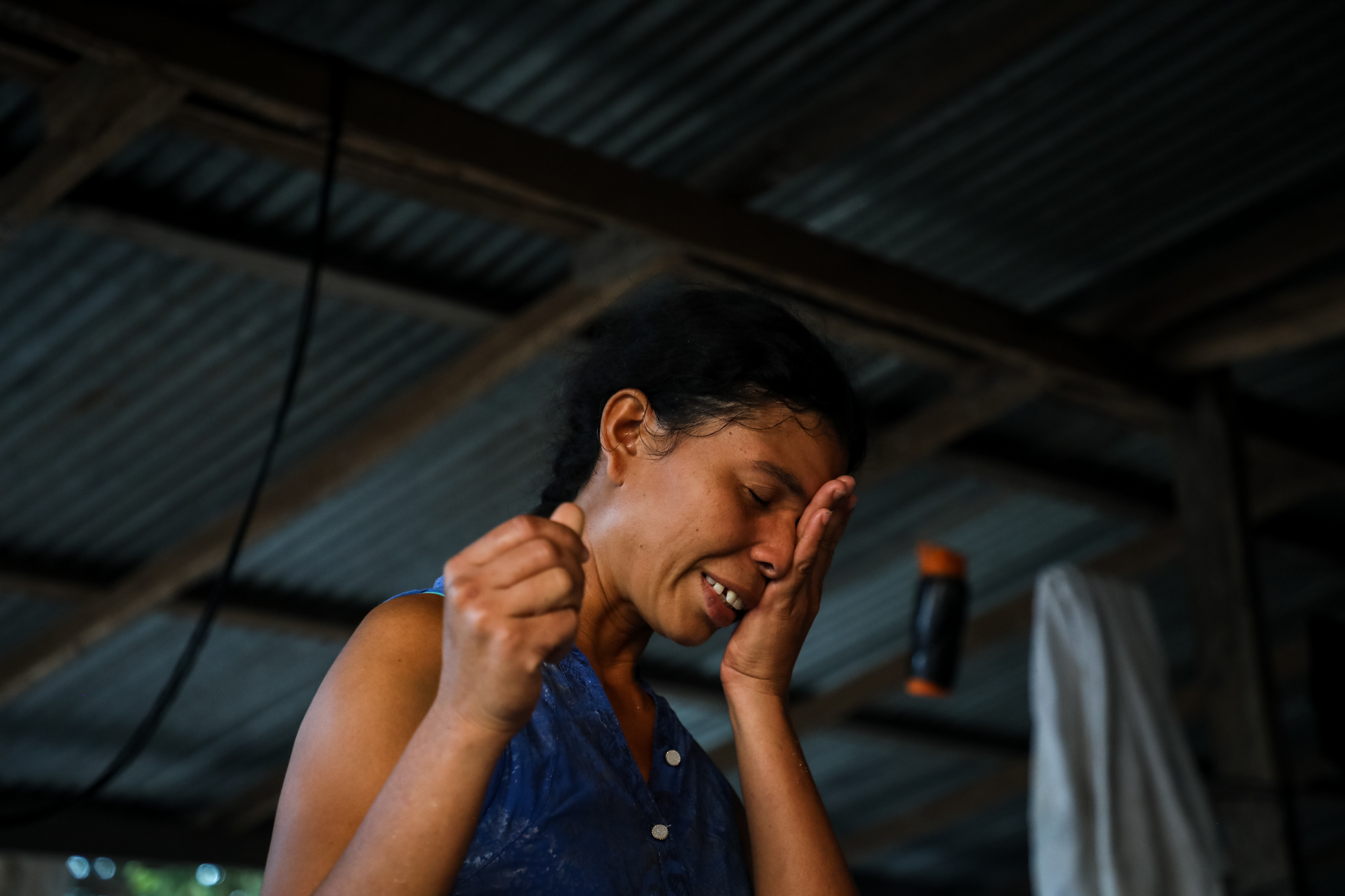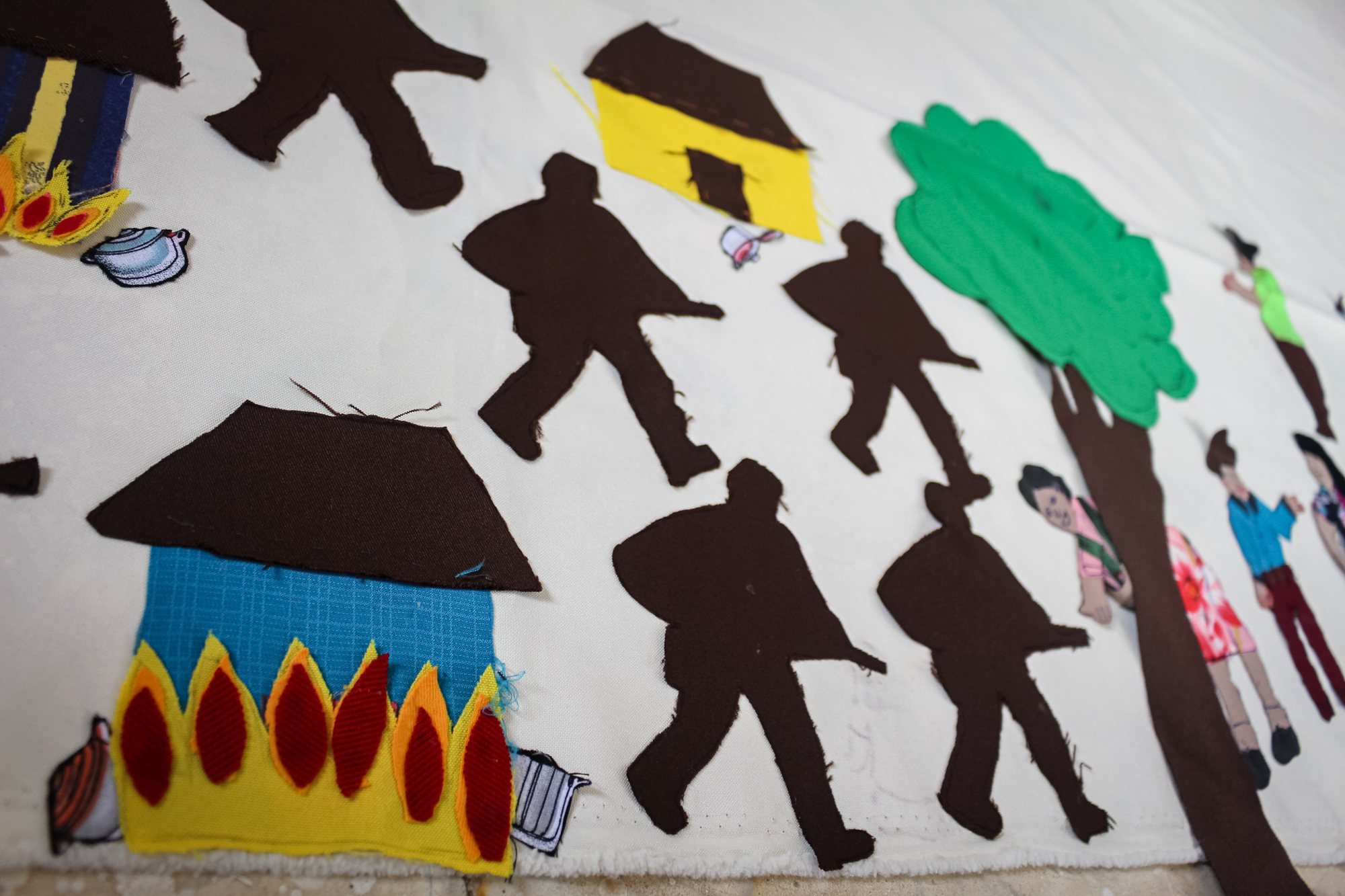CPTnet
19 April 2018
COLOMBIA PHOTO ESSAY: Love for the land

From Barrancabermeja to the heart of Las Pavas.
This photo essay summarizes the experience of the Christian Peacemaker Teams (CPT) Holy Week delegation. It collects stories. Stories made into songs and memories that give an account of some dynamics and realities of the Magdalena Medio region, in particular the Las Pavas community.

This is a community that lives life with hope and with the certainty of becoming one day sovereign on their land. Despite the complexity and difficulties they face, they opened the door to their lives to the CPT delegation to share their stories of resistance and resilience.
This has been a journey of people, more than places.The delegation and the entire Colombia team led a public nonviolent action with the accompaniment of other organizations against ECOPETROL, Colombia´s state oil company, in solidarity with the ex-employees of that company: José Melo and Robinson Guerra, who started a sit-in more than two months ago at the gate of the refinery, claiming their labor rights and adequate compensation, after having suffered severe damage to their health due to overexposure to harmful chemicals.

The company is silent about these cases and justifies its inaction using labor outsourcing as a way that minimizes its liability and limits workers’ labor rights.


Ecopetrol, a symbol of prosperity and economic growth, and an important source of work, is at the same time, causing great environmental damage and driving various harmful social dynamics. The decline of this industry opens the way to the emergence of another commitment to regional growth, on which the development expectations for the Magdalena Medio region are centered. For example, the construction of a multipurpose port, built by Impala Terminals that will connect several cities along the Magdalena River. Its main purpose is the transport of hydrocarbons, but the shipment of raw materials and merchandise is also contemplated. It is uncertain if the implementation of this new project will result in substantial improvements for the region or will replicate the model of the oil industry along with its mistakes.


The Magdalena River is an integral part of the life of the inhabitants of Buenos Aires in Las Pavas. They make a living from and enjoy it. The river has also witnessed the conflict and its consequences for the communities and its surroundings.
After seven hours on the road, we shared with the community a swim at the end of the day. It was an invaluable experience in which time seemed to be suspended. That day we found that simple things have a huge meaning!

The community leaders tell their story of peaceful resistance, under constant siege from the palm company Aportes San Isidro which has invaded their territories, planting oil palm monoculture, before the undaunted gaze of the State, which does not fulfill its duty of protecting the farming communities and prioritizes strengthening large business interests over vulnerable populations that struggle to remain on the land and develop their life projects in that region.

You can see in the faces of these farmers, the joy and satisfaction when they open their homes and show us their crops. They transmit their love for their land and make us feel that the land they have fought so hard for is the land of all.
Since 2001, CPT has accompanied, as an international actor, Colombian communities affected by the armed conflict, safeguarding life, supporting the restitution of rights (including return to communities) and working on transformation of structures of domination in the Magdalena Medio region. The communities where CPT is present recognize their role in the processes of resistance and peace building.

Love for the land, moves the farmers of Las Pavas to return and remain in spite of the scarcity of water and food. Solidarity and creativity allows them to survive the hardship of the climate, harassment of the palm oil workers and the negligence of the State, which forgets its farmers and even more, forgets that the farmer is the one who allows food stocks to be filled in the cities.


Efraín describes himself as a farmer, not as a worker. He says he has lots of gray hair but is young. His cheerful singing is proof of that. He remembers how these lands were a battlefield until recently. As we listened to his stories, heavy machinery and trucks from the palm oil company Aportes San Isidro passed by us. The noise it made, brought to mind the misfortune of this community; Intimidation, violence and forced displacement.
Efraín’s and other grandparents, leaders of the process of resistance, hope is to be able to leave as inheritance, a united community with strong ties to the earth. His dream, like that of 123 other families of this community, is that through the cultivation of the land they can live with autonomy, freedom and peace.
Naudis, recounts the difficulties she faces as a woman, wife, daughter, mother of four children and as a farmer rooted in the land committed to the process of resistance in her community. Her strength is the engine for transformation. Her hope feeds the dreams of a more just and dignified future. Naudis, maintains a firm conviction that by means of faith, unity and education, social changes that she has waited so long for are possible.

The delegation listens attentively to the narratives that in the form of songs give life to the stories and wisdom of a generation that has remained firm in the face of adversity. Their sense of belonging to the territory and their own, allows them to keep hope alive and reaffirm the use of nonviolence. In this space of passing down knowledge, open dialogue, spontaneity and frankness prevailed accompanied by the songs of those who have found in music a tool of restoration and memory.


Although the armed conflict in Colombia is a single tragedy shared by the same people, each story has its own faces. That is how throughout the Colombian territory, women have been given the task of telling their own experiences, of collecting their memories, and in this process of remembrance, the women of Las Pavas have not been the exception.
This loom is more than a mere fabric full of figures, colors and shapes, it is a collective work that symbolizes and immortalizes a story that stitch by stitch chronologically narrates what has been its struggle in the territory and its forms of resistance. The history in this loom is missing a part. Its outcome, one where they are the protagonists, and the owners of their own voice. In this outcome they dream of a wholistic peace that brings with it conditions for a dignified life and positive action from the State, with the fulfillment of a government promise that until today, is covered in the dust of oblivion.
https://www.facebook.com/cptco/videos/1648491158537344/
United we will conquer – Efrain Alvear
Together, we will be able to conquer the war that makes us cry
From the fields abundance will return , in all the towns we will have peace,
Peace in Colombia will remain and even more if we look to God for power
And all the men that´s what we are going to do, the young man, the boy and woman too.
We suffer injustice, also intolerance
That was the night, dawn is now rising
In our streets there will be no more violence
And let the cry be heard, how good it is to overcome!
Peace in Colombia will remain and even more if we look to God for power
And all the men that´s what we are going to do, the young man, the boy and woman too.
That is why we strive to teach, that our children know how to unite
In that way, we are going to enjoy, years of peace in our country
Peace in Colombia will remain and even more if we look to God for power
And all the men that´s what we are going to do, the young man, the boy and woman too.



